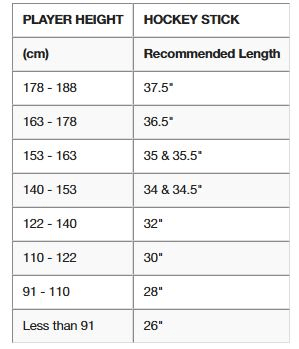Choosing the Right Hockey Stick
Before you head out onto the field to start practicing your stick handling, you have to choose the right hockey stick, which can be a difficult decision. Although colour and style might seem like the most important part of buying a stick, the feel and performance of the stick is much more important.
Weight:
The weight of the hockey stick is usually chosen based on personal preference or position.
There are two different types of sticks that field hockey players use: wooden and composite. While wooden sticks are known for strength and durability, composite sticks are heavier and more powerful. Based on weight, different sticks tend to work for different positions.
- [ 530g - 570g ] Designed for forwards: Lightweight stick which does not interfere with or hold back a players rapid stick work.
- [ 590g ] Designed for midfielders: Mid-weight stick that benefits both defensive and offensive manoeuvres.
- [ 620g - 680g ] Designed for backs: The heavier sticks provide power and distance behinds your shorts, making a stick this heavy perfect for clearing the ball.
Head Shape:
- Shorty: One-piece head that allows for quick manoeuvrability around the ball. Generally used by offensive players for its balance and control.
- Midi: Two-piece head that is multi-laminated. Slightly longer allowing for extra surface in reverse stick play. Used by field hockey beginners and midfielders. Good for flicking, receiving, and reverse play.
- Hook: Two piece head that is multi-laminated. It has a J-shape that hooks up and is designed with extra surface for receiving and increased ball control.
Size & Length:
The size and length of the stick you use completely depends on the length of each individual player's body. Field hockey sticks range from about 28" to 38" long, and having the proper stick length can drastically affect your game. If your stick is too long, you may end up undercutting the ball or making hard contact with the ground, causing the stick head to fracture. If your stick is too short, you may be bending down too much which can cause serious long term back problems.
There are two simples ways to check whether the stick is perfect for you:
- Place the base of the stick on the ground and make sure the stick is straight. Hold the stick with two fingers at the top of the handle and check to make sure the top of the stick is right along your hip bone.
- Hold the stick upside down and insert the head of the stick in your armpit. The stick should end near your knee and fall no more than two inches below the bottom of your knee cap.

Tip: Defensive players typically use longer sticks to reach and drive the ball further. Offensive players will use shorter sticks to improve their stick handling skills.
Main Points to consider:
- Does the stick feel comfortable? Take into account the weight and bow of the stick.
- Does the stick press into my stomach or do I bend too low and hurt my back?
- Can my hands comfortably control the head of the stick?
Before you buy the stick, make sure you practice moving around the store with the stick to ensure comfortability and ease. Keep in mind that the grip of the stick is something that can be changed easily, so try not to choose your stick based on the grip thickness or feeling. Once you have purchased the perfect stick for you, head out to the field and start practicing your dribbling, passing, and shooting with a professional field hockey coach or friend!

